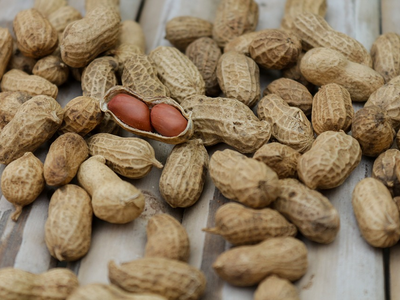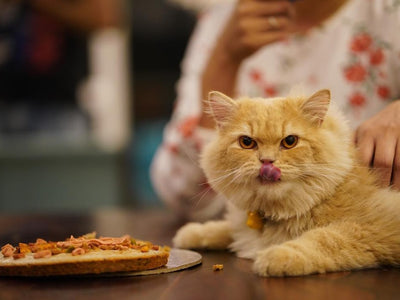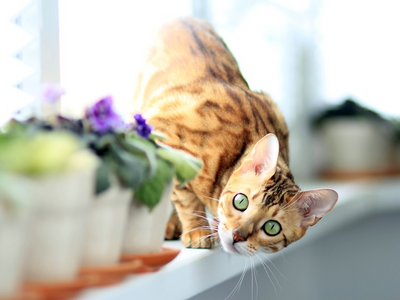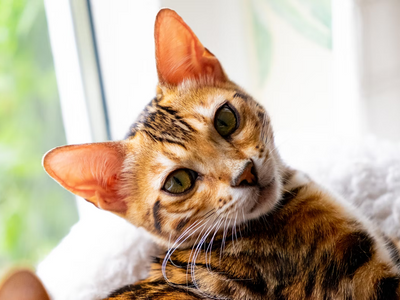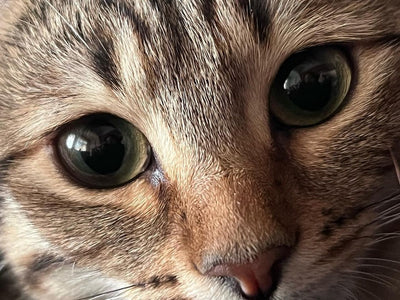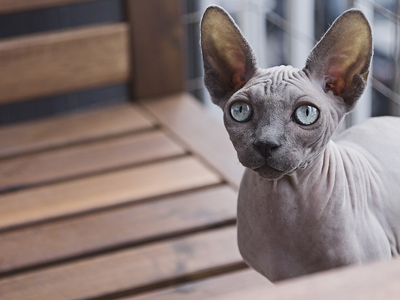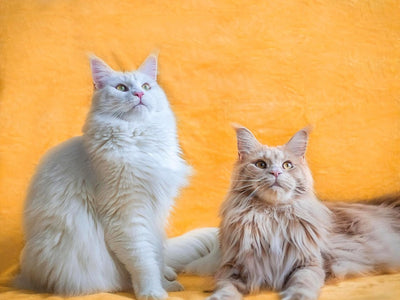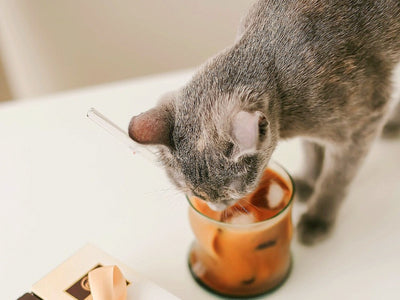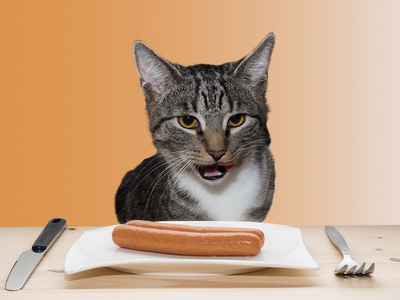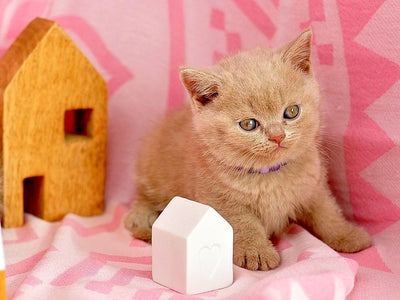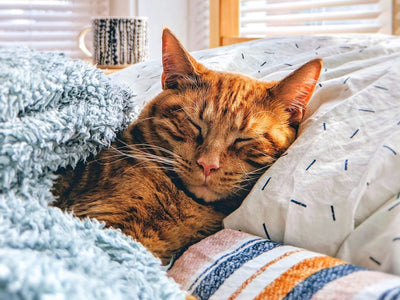29.10.2021
Tips on the best cat food for a sensitive stomach, diarrhoea, and healthy digestion from Untamed
There is nothing more heart-wrenching than watching your cat or kitten heartily tuck into a meal, only to spend the next few hours suffering from nausea, stomach pain, or digestive problems.
In most cases, diet is the cause of tummy upsets in your cat. Regardless of whether you are feeding dry kibbles, wet food, raw meat, or tailor-made or home-cooked meals, there may be something in there that disagrees with your feline.
Food sensitivity and diarrhoea could also be linked to an underlying condition in some cases, so it’s wise to be careful.
Untamed has the info and advice you need to choose the best cat food for a sensitive stomach, diarrhoea, and gastrointestinal problems in your feline.

I’m not sensitive; I’m in touch with my fussy side!
Source: Amir Ghoorchiani
Can you get sensitive stomach cat food?
The best way to ensure cats don’t experience tummy upsets from their food is to feed them according to their natural requirements.
Cats are obligate carnivores, so their bodies have evolved to process:
- Animal protein
- Animal fat
Animal protein
Protein is made up of combinations of amino acids and is necessary for a cat to grow and maintain:
- Muscles
- Skin and coat
- Organs
The feline digestive system is designed to metabolise amino acids from animal protein—a cat can get the amino acids required from vegetable protein sources, but the process is considerably less efficient.
This means that a cat would have to eat larger amounts of vegetable proteins to get the amino acids needed, and getting enough taurine (one of the crucial ones) can still be a problem.
Not all meats are equal, though—the percentage to which a cat can metabolise each protein source is known as the biological value (BV), and the most common proteins rank as follows:
|
Protein source |
Biological value (how much of a protein source a cat can use) |
|
98% |
|
|
Tuna, salmon, sardines, or prawn |
94% |
|
Beef and pork or ham |
87% |
|
Soya |
68% |
|
Wheatgerm, corn, sweetcorn, and other vegetable proteins |
Below 65% |
If a cat food contains high proportions of any protein source with a BV of over 90 per cent, it should be highly digestible. Even better is if the food only uses one high-quality protein because it reduces the risk of allergic reactions.

The best protein sources for your cat
Image (c) Untamed
Animal fat
Fat is a viable energy source in cat food and also delivers essential fatty acids, such as:
- Linoleic acid
- Arachidonic acid
- Omega-3 and omega-6
These help maintain cell structure and regulate the healing process in a cat’s body.
Animal fat is also irresistibly tasty for cats, so meals rich in animal fat will be your kitty’s favourite. Keep in mind that fat should be kept under 20% in their diet.
Besides these two main ingredients, there is very little that your cat needs—a good cat food for sensitive stomachs shouldn’t be complicated.
All the vitamins and minerals required are found in meat, so there is little need to add supplements to your kitty’s diet.
The most important point is that a high-quality product means your kitty doesn’t need much food to get all the necessary nutrients.
Smaller portions put less strain on your feline’s body. If your cat has a sensitive stomach, modest servings can significantly reduce the risk of tummy upsets.
What is the best cat food for diarrhoea?
The best cat food for diarrhoea addresses both causes and symptoms of the condition.
Diarrhoea caused by something other than a parasite, viral infection, or diagnosed condition can usually be traced back to something your kitty has eaten.
The steps to helping your feline get over a runny tummy are:
- Address the cause
- Help the digestive tract recover
- Manage hydration
Address the cause
If you are lucky, you will be able to spot what has caused the diarrhoea in the first place. It may be something as obvious as the leftover kebab that kitty has rescued from next door’s bin or a new diet you have tried out for the first time.
You should immediately switch to a hypoallergenic, protein-rich food that uses a protein your kitty doesn’t normally eat.
As an example, if your feline usually eats food rich in chicken, you could swap to the following:
- Salmon
- Tuna
- Prawns or shrimps
As long as you make sure the food is hypoallergenic, you should see their condition improving rapidly.
Help the digestive tract recover
Many vets used to recommend starving a cat with diarrhoea—if you feed kitty high-quality food, there is no need to do this.
The food you choose to help your cat recover should deliver a high calorie count in a small portion. It ensures that energy reserves are kept topped up to aid recovery while not putting too much strain on your kitty’s system. This also helps to avoid the dangers of your cat refusing to eat.
Manage hydration
Dehydration is a potentially alarming side-effect of diarrhoea and can cause serious damage to your cat’s kidneys and lower urinary tract.
Wet cat food contains a high proportion of water, and it’s a sensible choice to help your feline take enough liquid on board.
If you regularly feed dry biscuits, you should soak them in broth or cat gravy to add moisture.
Can Untamed cat food help your sensitive feline?
When it comes to helping sensitive cats and those suffering from gastro problems, Untamed ticks all the boxes.
Our wet cat food comes in manageable portions and delivers protein, calories, and nutrition in a mixture perfectly designed for your kitty.
All our products are made according to the following ethical criteria:
|
The Untamed ethos |
What this means for your feline friend |
|
High levels of animal protein |
All our products contain up to twice the amount of animal protein offered by cheaper brands, so even fussy cats love the taste |
|
Hypoallergenic |
All our recipes have been specifically formulated to be minimally processed and free from common allergens. We don’t use grains or cereals, artificial flavours, or additives of any kind—even the most sensitive of cats should have no problem with Untamed delicacies |
|
Vet-approved formulas |
We formulate our diets under the scrutiny of veterinary nutritional experts to ensure our food gives your cat everything they need to be healthy and happy |
|
Human-grade ingredients |
We use human-grade ingredients, so your feline gets only the best |
|
Gentle steaming |
We don’t believe in aggressive cooking methods, but gently steam our meals to destroy harmful bacteria while sealing the goodness in |
Next time your cat gets a tummy upset, give Untamed a try and see how quickly our high-quality food gets your furry companion on the road to recovery!
Give Untamed a try and watch your kitty thrive!
At Untamed, we want cats to stay healthy and happy.
We know how important diet is in helping your feline maintain a well-functioning digestive system, and we are committed to making sure our products are the best sensitive cat food your cat can get.
Once you switch to Untamed, you should start seeing a difference within a week, as follows:
- After week one—You should see less mess in the litter tray, and your cat’s energy levels should go up
- After two months—Your feline should become leaner and more muscular as a result of the high protein in our food
- Within four months—Your cat’s coat should look sleek and shiny, and hairballs should decrease
- Life-long—Your kitty should stay playful and full of energy, without suffering frequent bouts of diarrhoea and with little interest in any food apart from Untamed
Giving Untamed a try is easy—here’s what you need to do:
- Visit our Try Now page
- Tell us more about your cat
- Select a meal plan and order a trial pack of Untamed delicacies
Your cat food trial pack will land on your doorstep quickly, and your kitty can start tasting the new delights. Give us feedback on what flavours and recipes got the most love, and we will send you a monthly cat food subscription box based on it.
We will replenish your cupboard every month, and you can let us know if we need to change anything at any time.
Your kitty will love you for the food you’re serving, and sensitive tummies and diarrhoea can become a thing of the past!

Finally, some contentment!
Image (c) Untamed
What causes a sensitive stomach?
Your cat can react to food badly for various reasons, even after having seemingly loved eating it.
Having a sensitive stomach is a generic term for your cat following up a meal with:
- Nausea
- Vomiting or retching
- Diarrhoea or constipation
- Obvious discomfort, including lethargy or hiding away
Cats can react badly to various ingredients in their food, including:
- Proteins
- Carbs and grains and cereals
- Additives or artificial ingredients
Proteins
An allergic reaction to a certain protein source is common in cats.
It happens when your kitty’s body misidentifies a protein that has entered the body, thinking it is a harmful invader.
Your cat will react in two ways:
- Trying to isolate and neutralise the insurgent in the body
- Attempting to get rid of the invader as quickly as possible
Isolating the protein usually involves attacking it with the body’s immune system. You’ll recognise the reaction by small red pustules on the skin your feline will lick constantly.
Getting rid of the invader often means clearing either the stomach or the intestines out (with predictable consequences for your carpet and furniture).
Carbs, grains, and cereals
Some cats have intolerances to:
- Gluten
- Simple carbs such as lactose (present in milk and other dairy products)
- Grains and cereals in general
An intolerance is different from an allergy. While an allergy involves your cat's body mistaking a nutrient for something harmful, an intolerance occurs because the feline doesn’t have the right enzymes to process something in the food.
The problem is that grains and cereals are often used in cheaper cat foods as fillers—they help bulk up the product at a relatively low cost to the manufacturer. As appealing as it may be to some cat parents, felines should not be placed on vegan diets.
Additives or artificial ingredients
Many budget cat foods use artificial:
- Colourants
- Flavour-enhancers, such as cat jelly or cat gravy
- Preservatives
- Additives to improve the texture of the food
While none of these ingredients is harmful to cats, they provide no nutritional value and can cause stomach upsets or diarrhoea.
The most common additives causing gastrointestinal problems or allergic reactions in cats include:
|
Additive type |
Name |
|
Colourants |
|
|
Preservatives |
|
|
Flavour-enhancers |
|
|
Stabilisers and emulsifiers |
|
If you suspect your feline’s food may be the reason for sensitive stomach issues, you should check the label to see whether the above ingredients are listed.
Should you spot a potential culprit, it may be time to consider other food options.

Cats that roam are always likely to go scavenging
Source: Pixabay
What can cause diarrhoea in your cat?
Diarrhoea is most often caused by a bacterial imbalance in your cat’s intestines.
Bacteria—both beneficial and harmful—are permanent residents in cats‘ intestines. The good bacteria include:
- Lactobacilli
- Bifidus
The bad bacteria, such as E. coli, salmonella, and listeria, are normally kept in check by the beneficial microorganisms but can gain the upper hand if boosted by something your cat eats or by an unwanted intruder.
Apart from bacterial imbalances, the most common causes of diarrhoea in cats are:
- Parasites
- Viral infections
- Toxins
Parasites
Cats can suffer from worms, the most common of which are:
|
Feline worm types |
Explanation |
|
Roundworms |
Roundworms live in the gut and are highly infectious, being passed on through:
Roundworm eggs can stay alive for years outside a cat’s body, so it is crucial to treat your feline regularly to halt their growth |
|
Tapeworms |
Tapeworms wrap themselves around the lining of the intestines and feed off the nutrients your kitty should be getting. Their eggs are passed out through the faeces and can be transferred to a new host when your cat catches prey |
Viral infections
Several viruses can easily cause severe diarrhoea in your feline, most notably:
- Panleukopenia virus
- Feline leukaemia virus
- Feline immunodeficiency virus
If your cat has any of these infections, the result can be acute or chronic diarrhoea, potentially leading to rapid weight loss.
Cats losing weight is a serious issue, as it is a sign that they are mobilising fat reserves to provide energy. This can flood their liver with fat, often leading to hepatic lipidosis or fatty deposits around the liver surface.
Toxins
Cats are naturally curious and willing to try new foods.
While this may make your life easier when it comes to feeding time, there is a danger that they will inadvertently try something toxic—typical examples around the house are:
- Chocolate
- Grapes or raisins
- Grass sprayed with pesticides
- Alcohol or caffeine
- Berries and citrus fruits
- Onions, garlic, or chives
- Foods containing yeast
The least you can expect after such an adventure is diarrhoea. If you think your feline may have eaten something toxic, you should get them to a vet as soon as possible to prevent serious problems.

The face of guilt after having stolen something
Source: Cottonbro
What can you do about your kitty’s food allergy?
The better you understand what causes your kitty’s sensitive stomach and diarrhoea, the better you will be able to eliminate the triggers.
The steps you should take to reduce the risk of gastrointestinal issues include:
- Routine cleaning of areas where your cat likes to hang out
- Periodic deworming
- Regular check-ups at the vet’s
- Keeping potentially harmful substances out of reach
The biggest long-term change you can make to your cat’s diet is switching to a food with no irritants that can cause tummy upsets.
This may require a bit of research on your part, most importantly by checking your food‘s:
- Ingredient list
- Guaranteed analysis
Ingredient list
The ingredients of every commercial cat food have to be listed:
- In full
- In order of volume, from largest to smallest
Any cat food with the words “complete and balanced“ on the label contains everything that your cat needs to live, but there may be some ingredients causing an upset.
Things to look out for include:
|
Ingredient list watch-outs |
Explanation |
|
Badly defined protein sources |
If your feline’s food lists “meat and animal derivatives“ anywhere among its ingredients, you should shy away. This is a catch-all phrase covering meat, offal, offcuts, and parts of animals that can’t be used for human consumption. It most likely means that the manufacturer buys whatever meat is the cheapest for each production run. The food formula could change from week to week, so you may only notice sporadic tummy upsets |
|
High levels of grain and cereals |
You may spot several ingredients, such as:
If the list of grains and cereals is long, this is an indication that your kitty’s food has high concentrations of ingredients cats can be intolerant to |
|
Additives and E-numbers |
Adding artificial ingredients to cat food suggests that the main components are insufficient to deliver the required nutrients. You should avoid cat food that relies on artificial additives |

![Associated image for What human food can Sphynx cats eat? [Comprehensive list]](http://untamed.com/cdn/shop/articles/what_human_food_can_sphynx_cats_eat_Featured_400x300_crop_center.jpg?v=1648705074)
